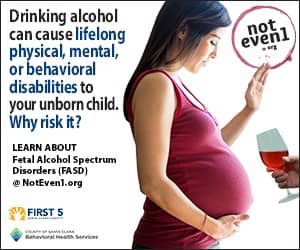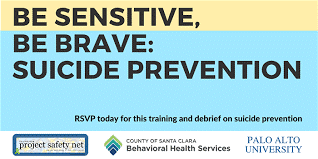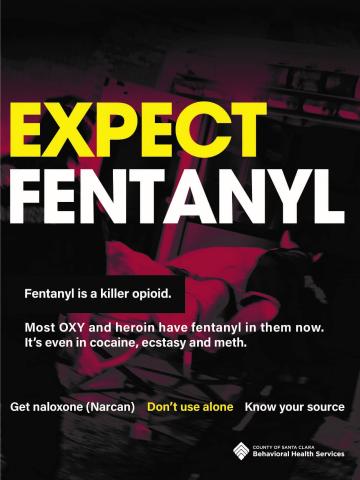Spotlight: Behavioral Health Services Department
The vision of the Behavioral Health Services Department is to support the residents of our county in being physically and emotionally healthy, happy, and thriving. Direct services are provided to those in the public’s care, and prevention and other programs reach and assist many other Santa Clara County residents.
The County of Santa Clara Board of Supervisor approved nearly $28 million of Mental Health Services Act funding to expand crisis prevention services. By looking through a race equity and social justice lens, more services will be made available that can help the unserved and underserved. For communities that are historically unserved, underserved, or inappropriately served, interacting with law enforcement can be a frightening, distressing, and even deadly experience. The program’s response model includes community residents, mental health workers, and emergency medical services personnel. These teams will respond to mental health crisis events and provide an alternative to a law enforcement response. Crisis prevention services bring better care and value to the community.
2020 saw the largest gain in alcohol consumption in nearly 20 years, which raised concerns that more women may be having an alcoholic drink during pregnancy. A new community campaign was launched to raise awareness of Fetal Alcohol Spectrum Disorders (FASDs) and the health risks to an unborn child. The campaign featured English and Spanish social and digital media, bus signs and other outreach activities. The goal was to raise understanding that there is no safe amount of alcohol to drink during pregnancy, not even one. Digital ads were seen by nearly 5 million people, and digital ads delivered to mobile devices near selected locations (like a baby store), acquired over 5.5M impressions. Over 2.5M people viewed either the English or Spanish video on YouTube. The campaign supports efforts to bring better value to our community.
The Mission Street Recovery Station (previously the Sobering Center) expanded to provide access to mental health and substance use treatment services. The Recovery Station can be a first step in reaching better health. When a person is interested in recovering from drug or alcohol use, they are immediately connected to services and providers. The Recovery Station will also provide participants access to mental health services and will screen them about their housing needs. Since the program started in late 2017, over 3,250 people have benefitted from their service.
In September the cities of San Jose, Palo Alto, and Cupertino proclaimed September as Suicide Prevention Awareness Month. The Suicide Prevention Program also worked with the cities of Campbell and Cupertino to adopt suicide prevention policies, making it 9 cities, who represent about 86% of the population of Santa Clara County, with these types of policies. These actions help to overcome the stigma associated with mental illness and raise awareness through trainings, presentations, and the distribution of information so more people get the care, support, and treatments they need. In addition, all Santa Clara County school districts have student suicide prevention policies.
The Suicide Prevention Program began offering two new and unique trainings. Be Sensitive, Be Brave (BSBB): Mental Health and BSBB: Suicide Prevention. Each culturally competent training is designed for anyone in the community who is interested. The training is in partnership with Palo Alto University and will help more people realize better health.
Delivering better care, service, and health to our schools
As students returned to school, BHSD partnered with the County Office of Education to increase and expand services for all schools. Trainings were offered to all school districts and included Mental Health 101, Mental Health First Aide, Trauma Informed Care 101, Substance Use Prevention – A Parent’s Guide, and Suicide Prevention.
School Linked Services (SLS) provides students and families with school-based coordinated services to improve health and wellbeing through a community participatory approach. These services improve protective factors like family relationship, decrease risk-factors such as behavioral and emotional problems, and enhance service accessibility and links to resources. The goal is to support success in school and in life.
School Linked Services Family Engagement Program was expanded to additional school districts. With existing SLS sites, services increased by 10% to serve more students. The capacity of the Mobile Crisis Response was also increased by 10% to serve any student in need of crisis services.
The Child Intensive Full-Service Partnership has been working in two school districts: Alum Rock Union School District and Campbell Union School District. The County Office of Education conducted a survey and learned that these two school districts expressed a need for intensive services to support students and their families affected by various tragic community events. These efforts brought better care and services to school communities.
Behavioral Health is here to help 24 hours, 7 days a week including holidays!
| Mental Health Services | Substance Use Services | Suicide & Crisis Hotline |
|---|---|---|
| 1-800-704-0900 | 1-800-488-9919 | 1-855-278-4204 |
Saving lives through opioid overdose prevention activities
Because of an increase in the number of fentanyl overdoses in Santa Clara County, the Behavioral Health Services Department continued to conduct campaigns to raise awareness about the danger of fentanyl. By raising awareness of this issue, the department and its partners are helping to bring better care, service, and value to the community.
The “Fentanyl Takes Friends” campaign started in 2020 and continued in 2021. Primarily a social media effort, it focused on younger adults using Snapchat, Facebook, Instagram, and Twitter. The initial campaign had over 3 million impressions. A second campaign, “Expect Fentanyl” launched in August 2021 and will continue through November 2021. Research conducted with individuals between 25 and 39 years, who take opioids, provided insights on visuals, messaging, and outlets for this effort. The campaign is taking place on social media (Snapchat, Facebook, and Twitter), as well as audio placements on Spotify.
BHSD has also developed an opioid prevention toolkit and offers informational presentations about alcohol and other drugs, including opioids. Presentation have taken place throughout the community. In addition, the department funds seven Community-Based Organizations in Santa Clara County to offer trainings and healthy, alternate activities to divert youth from substance use, build leadership and healthy coping skills, and build connectedness with trusted adults and the community.
The Santa Clara County Opioid Overdose Prevention Project (SCCOOPP) is a coalition of health care professionals and volunteers that promote opioid safety throughout the community. The coalition provides public education and has formed a support group to help parents who lost a child to overdose with their grief. SCCOOPP also supports these parents in reaching out to other parents who are struggling with their child’s addiction issue.
The BHSD’s Addiction Medicine Clinics offer free education and free Narcan kits to all residents of Santa Clara County. The free Narcan kits are available at all Addiction Medicine Clinics in the East, South, North regions of the County, and Central San Jose. In the last 3 years, close to 10,000 kits have been distributed. Narcan kits are also being distributed at the Santa Clara Valley Medical Center Pharmacy to anyone with an opioid prescription of 50mg or above. The Needle Exchange Program, Valley Homeless Healthcare Program, and Custody Health also distribute kits to their patients or clients. Narcan kits are also used in County of Santa Clara hospital’s emergency departments to treat patients who have overdosed.
The Addiction Medicine Treatment Division of BHSD has been leading efforts to expand treatment capacity for opioid addiction through the Medication Assisted Treatment (MAT) Program. In the last two years, MAT services have opened in:
- Santa Clara Valley Medical Center’s Emergency Department
- Inpatient units at SCVMC
- Ambulatory Care clinics
- Community Health Partnership clinics
In the last year, AMT launched its first Youth Opioid Treatment Clinic, focusing on providing treatment to youth and young adults. This summer O’Connor and St. Louise Hospitals’ Emergency Departments opened treatment services for opioid addiction, and this fall, the Public Health Department’s Needle Exchange Program will open its MAT program with support from BHSD.





